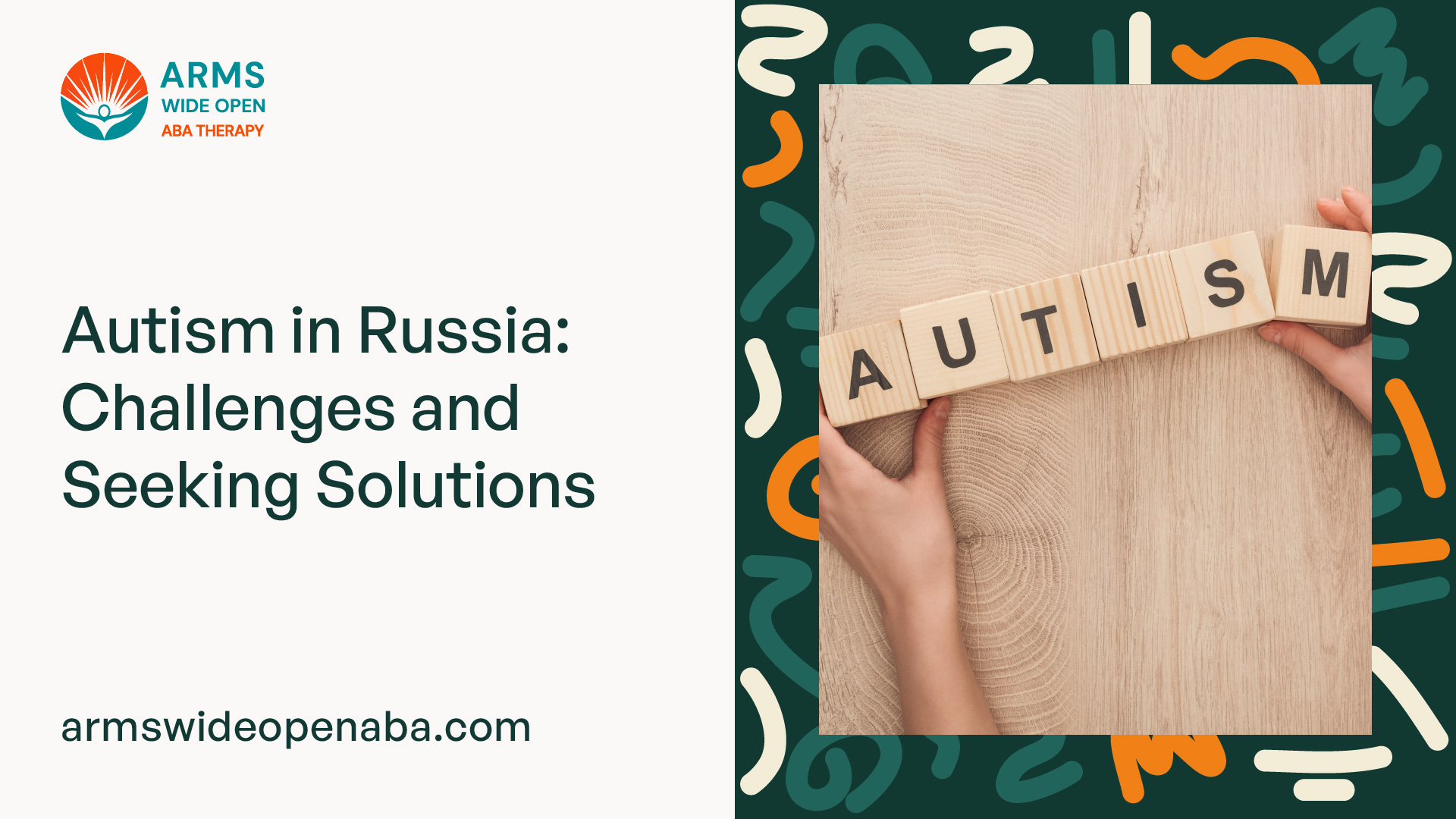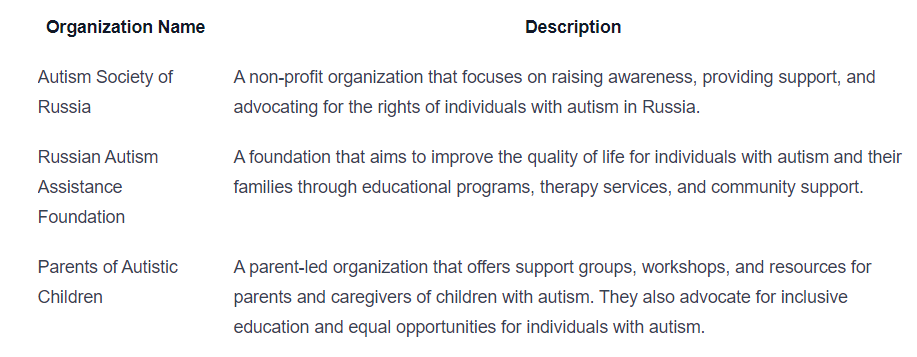Autism in Russia: Challenges and Seeking Solutions
Unveiling the challenges and solutions of autism in Russia. Discover the truth behind the stigma and the efforts for a brighter, inclusive future.

Understanding Autism in Russia
Autism, a neurodevelopmental disorder characterized by challenges in social interaction and communication, affects individuals worldwide, including Russia. Understanding the prevalence of autism in Russia and the cultural perspectives surrounding it is crucial in addressing the unique challenges faced by individuals on the autism spectrum in this country.

Prevalence of Autism in Russia
Determining the exact prevalence of autism in Russia can be challenging due to various factors, including differences in diagnostic criteria and limited data availability. However, studies and estimates provide insights into the prevalence of autism in the country.
According to a study conducted by the Russian Academy of Medical Sciences, the prevalence of autism in Russia is estimated to be around 1 in 86 children. However, it's important to note that these figures may vary depending on the region and the methodology used in the study.
Cultural Perspectives on Autism
Cultural perspectives on autism in Russia can significantly influence the experiences and support available to individuals on the autism spectrum. Historically, autism was not widely recognized or understood, leading to misconceptions and stigmatization.
In recent years, there has been an increased awareness and understanding of autism in Russian society. Efforts by advocacy organizations, healthcare professionals, and families affected by autism have played a crucial role in raising awareness and challenging misconceptions.
However, cultural perspectives on autism in Russia can still vary. Some individuals may perceive autism as a medical condition that needs to be treated, while others may view it from a more holistic perspective, emphasizing acceptance and accommodating the unique needs of individuals on the spectrum.
By understanding the prevalence of autism in Russia and the cultural perspectives surrounding it, we can work towards creating a more inclusive and supportive environment for individuals on the autism spectrum. This includes promoting awareness, challenging stigma, and ensuring access to appropriate resources and support services.
Challenges Faced by Individuals with Autism in Russia
Individuals with autism in Russia encounter various challenges that impact their daily lives and overall well-being. These challenges include stigma and misconceptions surrounding autism, as well as limited access to resources and support.
Stigma and Misconceptions
Stigma and misconceptions surrounding autism in Russia contribute to the difficulties faced by individuals with autism and their families. Lack of awareness and understanding about autism often leads to negative attitudes and discriminatory behavior. This can result in social isolation, exclusion, and a lack of acceptance within the community.
It is important to address these misconceptions and promote education about autism to combat stigma. By raising awareness, advocating for accurate information, and encouraging acceptance, society can create a more inclusive environment for individuals with autism.
Limited Access to Resources and Support
Another significant challenge faced by individuals with autism in Russia is the limited access to resources and support. Many families struggle to find appropriate educational and therapeutic interventions for their children with autism. The availability of specialized services, such as speech therapy, occupational therapy, and behavioral interventions, can be limited, especially in rural areas.
Additionally, the cost of accessing these services and treatments can be prohibitive for many families. The lack of financial support and insurance coverage further exacerbates the difficulties faced by individuals with autism and their families.
Efforts are being made to improve access to resources and support for individuals with autism in Russia. However, there is still a need for increased investment in services, the development of comprehensive support networks, and the expansion of educational opportunities for individuals with autism.
By addressing stigma, misconceptions, and limited access to resources and support, Russia can work towards creating a more inclusive and supportive environment for individuals with autism. Collaboration between government agencies, non-profit organizations, and the community at large is crucial in seeking solutions and improving the lives of individuals with autism in Russia.
Educational and Therapeutic Interventions
In addressing the challenges faced by individuals with autism in Russia, educational and therapeutic interventions play a crucial role. These interventions aim to support individuals with autism in their development and enhance their quality of life. In this section, we will explore the current approaches in Russia and highlight the importance of early intervention.
Current Approaches in Russia
In Russia, various educational and therapeutic approaches are being employed to support individuals with autism. These approaches focus on addressing the unique needs and challenges faced by individuals with autism, with the goal of promoting their overall well-being and development.
One commonly used approach is Applied Behavior Analysis (ABA). ABA involves breaking down skills into smaller, manageable steps and using positive reinforcement to encourage desired behaviors. This approach emphasizes the importance of structured and consistent interventions to teach new skills and reduce challenging behaviors.
Another approach used in Russia is Speech and Language Therapy. This therapy focuses on improving communication skills, including speech, language comprehension, and social communication. Speech and Language Therapists work closely with individuals with autism to develop their communication abilities and support their integration into social settings.
Additionally, Occupational Therapy plays a vital role in helping individuals with autism develop skills necessary for daily living, such as self-care and sensory regulation. Occupational Therapists in Russia employ various techniques to address sensory sensitivities, improve fine motor skills, and enhance independence in everyday activities.
Importance of Early Intervention
Early intervention is crucial for individuals with autism as it can significantly impact their long-term outcomes. Research has shown that early identification and intervention can lead to improved communication skills, social interactions, and cognitive development.
In Russia, efforts are being made to promote early intervention services for individuals with autism. Early intervention programs typically involve a multidisciplinary approach, including therapies such as ABA, Speech and Language Therapy, and Occupational Therapy. These programs aim to provide comprehensive support to children with autism and their families during the critical early years of development.
By starting intervention as early as possible, children with autism can benefit from targeted interventions tailored to their specific needs. Early intervention not only helps children acquire essential skills but also empowers parents and caregivers with strategies to support their child's development.
It should be noted that while progress is being made in the field of autism intervention in Russia, there is still a need for increased availability and accessibility of services, especially in remote areas. Continued efforts to expand and improve early intervention programs are essential to ensure that all individuals with autism have equal opportunities for growth and development.
In the next section, we will explore advocacy and awareness efforts in Russia, focusing on organizations and initiatives that are working towards a more inclusive and accepting society for individuals with autism.
Advocacy and Awareness Efforts
To address the challenges faced by individuals with autism in Russia, various organizations and initiatives have been working tirelessly to advocate for their rights and raise awareness about autism spectrum disorder (ASD).
Organizations and Initiatives
Several organizations in Russia are dedicated to supporting individuals with autism and their families, as well as promoting acceptance and understanding within society. These organizations play a crucial role in providing resources, support, and advocacy for the autism community in Russia.

These organizations, along with many others, collaborate to create a network of support and resources for individuals with autism in Russia. Through their efforts, they strive to enhance the lives of those affected by autism and promote a more inclusive society.
Progress and Future Directions
In recent years, there has been a growing recognition of the importance of addressing autism in Russia. Efforts to increase awareness, improve access to resources, and promote inclusivity have shown promising progress.
One significant development is the implementation of government initiatives aimed at supporting individuals with autism and their families. These initiatives focus on enhancing educational opportunities, providing therapy services, and promoting research in the field of autism. As a result, more individuals with autism are gaining access to the necessary interventions and support they need.
Furthermore, there has been an increasing emphasis on early intervention programs in Russia. Recognizing the importance of early identification and intervention, there has been a push to provide early screening and diagnosis for children with autism. This enables timely access to appropriate interventions, which can greatly improve long-term outcomes.
While progress has been made, there is still work to be done. Advocacy and awareness efforts need to continue to combat stigma and misconceptions surrounding autism. It is essential to ensure that individuals with autism have equal opportunities for education, employment, and social inclusion. Continued collaboration between organizations, government bodies, and the community will be crucial in driving positive change and creating a brighter future for individuals with autism in Russia.
Seeking Solutions for a Brighter Future
In order to create a brighter future for individuals with autism in Russia, it is crucial to address the systemic barriers they face and promote inclusivity and acceptance within society.
Addressing Systemic Barriers
Addressing the systemic barriers that individuals with autism encounter is essential for ensuring their well-being and quality of life. These barriers can include:
- Limited Access to Services: Increasing the availability and accessibility of diagnostic assessments, therapies, and support services throughout Russia is vital. This can be achieved by establishing more specialized centers and increasing funding for autism-related programs.
- Educational Support: Implementing inclusive education practices that cater to the unique needs of students with autism is crucial. Providing adequate training and resources for educators will help create an inclusive learning environment where all students can thrive.
- Employment Opportunities: Encouraging companies to adopt inclusive hiring practices and provide reasonable accommodations for individuals with autism can greatly improve their employment prospects. This can be achieved through awareness campaigns and partnerships between businesses and autism advocacy organizations.
- Legal Protections: Strengthening legal protections for individuals with autism, such as anti-discrimination laws, can help combat stigma and ensure equal rights and opportunities in various aspects of life, including employment, education, and healthcare.
Promoting Inclusivity and Acceptance
Promoting inclusivity and acceptance within society is crucial for fostering a supportive environment for individuals with autism. Some key approaches to promote inclusivity and acceptance include:
- Raising Awareness: Conducting awareness campaigns to educate the public about autism, its challenges, and the abilities of individuals with autism can help dispel misconceptions and reduce stigma. These campaigns can be carried out through various channels such as media, community events, and social media platforms.
- Community Engagement: Encouraging community involvement and engagement with individuals with autism can help foster understanding and acceptance. This can be done through organizing inclusive events, workshops, and support groups that bring together individuals with autism, their families, and the broader community.
- Support Networks: Establishing support networks and peer groups for individuals with autism and their families can provide a sense of belonging and facilitate the sharing of experiences and resources. These networks can be facilitated through community organizations or online platforms.
- Training and Sensitization: Providing training programs and sensitization sessions for professionals, such as healthcare providers, educators, and employers, can help them better understand the needs and abilities of individuals with autism. This can lead to more inclusive and supportive interactions in various settings.
By addressing systemic barriers and promoting inclusivity and acceptance, Russia can work towards a brighter future for individuals with autism. It is crucial to prioritize the rights and well-being of individuals with autism, ensuring that they have equal opportunities to thrive and contribute to society.
Sources
https://www.goldstarrehab.com/parent-resources/autism-in-russia
https://www.abtaba.com/blog/autism-in-russia
https://www.yellowbusaba.com/post/autism-in-russia
Similar articles
We’re here to help you

Our team is here to assist you in this process. Contact us for any assistance.
it’s easy to apply
We Accept Most Insurances
Our in-network insurance partnerships make ABA therapy more accessible to families throughout our service areas.







Our Insurance Process
We'll request your insurance details to help us verify your plan's coverage for ABA therapy. Once we've received this information, we'll walk you through your benefits, including copayments, deductibles and out-of-pocket maximums, so you know what to expect in advance.
Our team will then handle the preauthorization and all the necessary paperwork.
.svg)





















.jpeg)


































.jpeg)




.jpeg)







.jpeg)











.jpeg)
















